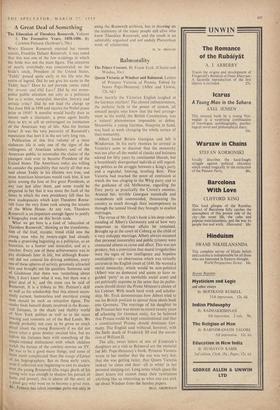A Great Deal ofSomething
The Education of Theodore Roosevelt. Volume I: The Formative Years, 1858-1886. By Carleton Putnam. (Scribner's, 70s.) WHEN Eleanor Roosevelt married her remote cousin, Franklin Delano Roosevelt, it was noted that this was one of the few weddings in which the bride was not the main figure. The attention of nearly everybody was concentrated on the bride's uncle, President of the United States. `Teddy' passed quite early in his life into the realm of legend. Did he not give his name to the Teddy bear? Does he not provide comic relief for Arsenic. and Old Lace? Did he not mono- polise public attention not only as a politician but as a writer, naturalist, moralist, literary and artistic critic? Did he ndt lead the charge up San Juan Hill in 1898 and receive the Nobel peace prize in 1910? A novelist would hardly dare to invent such a character, a press agent hardly dare to try to sell so extravagant an intimation of the American way of life. Alas for human fame! It was the very precocity of Roosevelt's reputation that hurt it in the not very long run.
Publication of this first volume of a most elaborate life is only one of the signs of the willingness of American scholars and of the American public to reconsider the claims of the youngest man ever to become President of the United States. The Americans today are willing to consider the possibility that nearly all that was said about Teddy in his lifetime was true, and most American historians would rank him, if not quite among the four or five great Presidents, at any rate just after them, and some would be prepared to bet that it was more the fault of the times in which his own presidency fell than his own inadequacies which kept Theodore Roose- velt from the very front rank among the tenants of the White House. At any rate, Theodore Roosevelt is animportant enough figure to justify a biography even on this lavish scale.
What we get here is a kind of 'education of Theodore Roosevelt,' showing us the transforma- tion of the frail, myopic, 'timid child into the Young man who by twenty-eight had already made a promising beginning as a politician, as an historian, as a hunter and naturalist, and as. a rancher. Every one of these achievements was to Pay dividends tater in life, but although Roose- velt did not conceal . his driving ambition, every one of these spheres of activity genuinely attracted him and brought out his qualities. Someone said of Gladstone that there was 'something about him, I don't know what it was, but there was a great deal of it,' and the same can be said of Roosevelt. It is a tribute to. Mr. Putnam's skill as well as his scholarship that this almost exces- sively earnest, humourless and uncritical young man should be such an attractive figure. The reader finds himself deeply involved in the Roose- velt fortunes, in the shady and shabby world of New York politics as well as in the more bracing and romantic air of the Bad Lands. We should probably not care to be given so much detail about the young Roosevelt if we did not know what a great destiny awaited him, but we follow his fortunes here with something of the simple-minded enthusiasm with which children / watch the heroes of the cowboy movies on TV. He was to be a good Many things, and some of them more complicated than the image cl'Epinal of his hagiographers: But in these early years, even if reflection was beginning to cast its shadow over the young Roosevelt (the tragic cleath of his Young wife was enough to shadow his pursuit of fame and power), this is above all the story of good guy who went on to become a great man. Mr. Putnam has taken immense pains not only in
using the Roosevelt archives, but in drawing on the testimony of the many people still alive who knew Theodore Roosevelt; and the result is an admirably organised and not' unduly Plutarchian work of scholarship.
D. W.






































 Previous page
Previous page